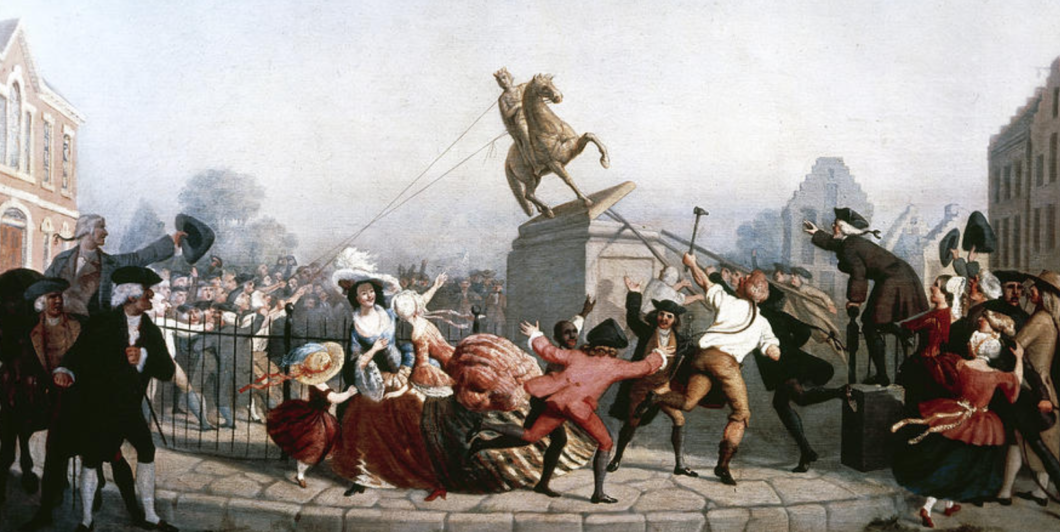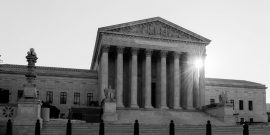The American Founders understood that large republics are easily undermined by populism. Brazil's Founders showed less foresight.
Republican Liberty and the Failure of Substantive Due Process
Americans today are wont to take the term “republicanism” as a synonym for democracy or, a bit more carefully, as a designation for representative democracy. There is an older and now largely neglected line of republican thought, much more prevalent during the years leading up to the American Revolution, that understands “republicanism” mainly in contrast to its opposite that it calls “arbitrary government.” Despite its neglect, this tradition has had a surprisingly-long half life in American constitutional thought over its entire history. The tradition influenced the debate over slavery in the U.S., but also factors significantly in contemporary debates. This line of thinking provided the theoretical backdrop for the Constitution’s separation-of-power system—reviving today with the renewed debate over executive power—and also provided the rationale for reading substantive content into the liberty guarantee in the Fourteenth Amendment (a.k.a. “substantive due process”).
Philip Pettit struggles to recover for the modern age this neglected aspect of republicanism in his book, Republicanism: A Theory of Freedom of Government. While he fails to trick out an entire political theory from what is just one aspect of the republican tradition, his attempt is noteworthy because it reminds of the neglected significance of this aspect of republicanism for U.S. constitutionalism.
The identification of republican liberty as the opposite of “arbitrary government” helps to make sense of several important constitutional arguments and positions thought curious today: The argument of (some) antebellum Americans who argued the national government had the power to end slavery under the original Constitution (and prior to the adoption of the Thirteenth Amendment). The butchers’ argument in the Slaughterhouse Cases that the New Orleans health code was unconstitutional under the Thirteenth Amendment (which outlawed slavery). And, of more than historical relevance today, the origins of the doctrine of substantive due process in this understanding of republican liberty. It also continues significantly to inform the concerns many people hold regarding the rise of the quasi-legislative and quasi-judicial roles often exercised by modern executive bureaucracies and by the rise of executive power itself in modern government.
Drawing on arguments of the British Commonwealth men of the early 18th century, Colonial complaints of being subject to “arbitrary” government at the hands of the British are frequently articulated by different colonial leaders throughout the pre-Revolutionary era. Complaints about “arbitrary government” usually do not stand alone, but are asserted alongside other complaints of rights violations. This is one reason this line of thinking became historically overshadowed.
Consider, for example, the argument James Otis makes in his 1763 pamphlet, Rights of British Colonies Asserted, against arbitrary government at the hands of the British. Otis observes that “no legislature, supreme or subordinate, has a right to make itself arbitrary,” and that “it would be a most manifest contradiction, for a free legislative, like that of Great-Britain, to make itself arbitrary.” Suggestive in what Otis means by this is his argument that “the supreme legislative cannot justly assume a power of ruling by extempore arbitrary decrees, but is bound to dispense justice by known settled rules, and by duly authorized independent judges.” Similarly, in 1774 John Adams identifies the “unlimited claims of parliament” as a claim of “arbitrary power.”
While concerned more with legislative arbitrariness at this time rather than executive arbitrariness, the concern remains the same in providing structure so that government actions are channeled to serve the public good rather than arbitrary political preference.
So, too, the Declaration of Independence nods to this aspect of republicanism in complaining of the abolition of “the free System of English Laws” in Canada and “establishing therein an Arbitrary government.”
After the Revolution, James Madison, quoting Montesquieu, centrally posits the separation of powers as one remedy preventing the exercise of arbitrary power:
There can be no liberty where the legislative and executive powers are united in the same person, or body of magistrates . . . . Were the power of judging joined with the legislative, the life and liberty of the subject would be exposed to arbitrary control, for the judge would then be the legislator.
Republican liberty means that people are not subjected to the arbitrary will of another, which is slavery. Hence, the repeated identification by the American colonists of the abuses of British rule with an intent to reduce Americans to the status of slaves. The argument wasn’t that Americans asserted the British designed to make chattel slaves of Americans. Rather, the Americans argued that if the principle be granted allowing for arbitrary governance, then they had conceded the critical principle distinguishing freemen from slaves, and there was no logical stopping point between their state and the state of abject slavery.
It is this set of connections between “republican liberty,” “arbitrary government,” and “slavery” that sets the stage for the working out of this tradition in a set of constitutional arguments sometimes difficult for modern Americans to understand.
As early as 1819, opponents of slavery in Congress asserted the Constitution’s guarantee clause in Article 4 (“The United States shall guarantee to every state in the union a republican form of government”) delegated authority to the national government to prohibit slavery in newly admitted states. Discussing the admission of Missouri to the Union in 1819, Congressman Fuller of Massachusetts argued that “The existence of slavery in any State is . . . a departure from republican principles.” He added, “Since, then, it cannot be denied that slaves are men, if follows that they are in a purely republican government born free, and are entitled to liberty and the pursuit of happiness.” He was not unique in making the argument. Within a few years the argument extended to asserting national authority over slavery in existing states as well.
Republican liberty’s identification of “arbitrary government” with “slavery” also helps in understanding the otherwise curious argument of the butchers in the Slaughter-House Cases that the New Orleans regulation at issue in the case (mandating that butchers use a single, centralized slaughterhouse to ply their vocation) violated the Thirteenth Amendment prohibition on slavery and involuntary servitude.
While Justice Field did not provide a full-throated argument in his dissent that the provision violated the Thirteenth Amendment, he did provide it sympathetic treatment:
The abolition of slavery and involuntary servitude was intended to make everyone born in this country a freeman, and, as such, to give to him the right to pursue the ordinary avocations of life without other restraint than such as affects all others, and to enjoy equally with them the fruits of his labor. A prohibition to him to pursue certain callings, open to others of the same age, condition, and sex, or to reside in places where others are permitted to live, would so far deprive him of the rights of a freeman, and would place him, as respects others, in a condition of servitude. A person allowed to pursue only one trade or calling, and only in one locality of the country, would not be, in the strict sense of the term, in a condition of slavery, but probably none would deny that he would be in a condition of servitude.
Justice Field then continued, quoting Senator Trumball on prohibited “badges of servitude”:
I take it that any statute which is not equal to all, and which deprives any citizen of civil rights which are secured to other citizens, is an unjust encroachment upon his liberty, and it is in fact a badge of servitude which by the Constitution is prohibited.
This antithesis between “republican liberty” and “arbitrary government” also provides the genesis of the controversial “substantive due process” doctrine of the Lochner era. The doctrine in fact rattled around state courts (and occasionally in Federal courts) for almost a full century prior to the infamous Lochner era itself.
The argument from republican liberty shares some affinities with arguments based on non-textual natural rights, but the republican liberty rationale for the doctrine derives it on distinct conceptual grounds. The argument is that non-arbitrary legislation is a requirement not of natural justice but as an implication of republican government. The argument is that the constitutional structure of American governments—all republican in form—carries with it implications that statutes that make permissible impositions on liberty must serve legitimate public purposes. Unconstitutional “arbitrary” government uses government power to privilege one class over another simply because of political power rather than public purpose.
Recall that the hallmark of substantive due process, at least regarding economic legislation, is not, as it is often suggested, the protection of “contractual liberty.” The doctrine’s crux is that impositions on liberty (whether contractual or other) must be justified by statutory means being reasonably related to legitimate public purposes.
The failure of substantive due process as a constitutional doctrine did not result from any weakness in its conceptual foundation in republican liberty, but rather from the difficultly judges had applying the doctrine consistently. One judge’s arbitrary legislation was another judge’s legitimate public purpose.
Yet just because a concept fails to be satisfactorily expressed in judicially applicable standards does not mean that it is incapable of legislative application. Thus, for example, the argument in the 1950s and 1960s that Federal civil rights legislation should be based on the guarantee clause rather the interstate commerce clause.
Pettit’s argument in Republicanism ultimately fails because he could not craft a philosophically omnipotent, stand-alone principle of “non-domination” in the opposition of republican liberty to arbitrary government. Nonetheless Pettit deserves credit for drawing our attention to principle that American colonists and constitutionalists took seriously for two centuries, and that dramatically affected the course of American constitutionalism.


